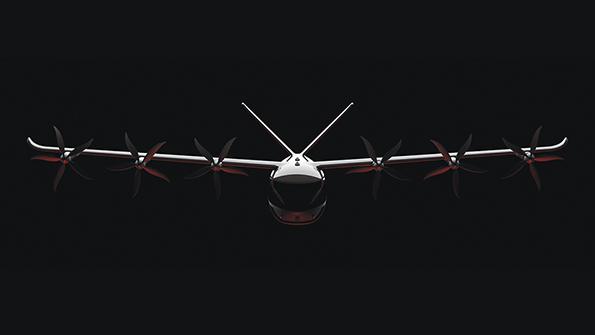
An urban air mobility startup with an experienced design team and backing from a Walmart executive has emerged from stealth with plans to develop an all-electric vertical-takeoff-and-landing air taxi.
Palo Alto, California-based Archer is led by entrepreneurs Brett Adcock and Adam Goldstein and backed by Marc Lore, CEO of Walmart eCommerce. The design team includes engineers who worked on electric vertical-takeoff-and-landing (eVTOL) development at Airbus Acubed, Joby Aviation and Kitty Hawk as well as at NASA and self-driving car developer Zoox.
- Design team has substantial eVTOL experience
- A large-scale demonstrator is planned to fly in 2021
Archer is developing a piloted eVTOL urban air taxi able to carry four passengers up to 60 mi. at 150 mph on today’s battery technology. Details are not being released, but the design is a fixed-wing aircraft with 12 electric motors and “some tilting,” says Adcock. A teaser image shows an aircraft with a V tail and six five-blade propellers on a high-aspect-ratio wing.
The startup hopes to set itself apart in the hype-plagued urban air mobility (UAM) market by tapping the experience of its design team to produce a safe, quiet vehicle with reliable performance at low manufacturing and operating costs.
Adcock and Goldstein sold hiring marketplace Vettery in 2018 for $100 million, while lead investor Lore sold his e-commerce company Jet.com to Walmart in 2016 for $3.3 billion. They are the latest internet entrepreneurs to put money into UAM. Google co-founder Larry Page backed Kitty Hawk while Pinterest co-founder Paul Sciarra co-founded Joby.
Archer is relatively late to the UAM game. “We are the underdog today, so we have a lot to prove,” says Adcock. “The goal is for us to show the world that we can build a vehicle that is high-performance, with low direct operating costs, high safety and low noise.”
The 44-strong team now “designing the perfect vehicle” is led by Tom Muniz and Geoff Bower. Muniz was previously vice president of engineering at Wisk, the Boeing/Kitty Hawk joint venture developing the Cora eVTOL. Bower was previously chief engineer on Acubed’s Vahana eVTOL.
Archer has flown a number of subscale testbeds and is now building higher-fidelity models. In parallel, it is working on an 80%-scale demonstrator that is planned to fly in 2021. “It is too early to say when we will certify,” says Adcock. “We need to start engaging with the FAA. We hope to certify in the most efficient way possible, but it will be a long journey.”
Unlike some eVTOL startups that are counting on promised advances in battery technology to achieve their performance claims, he says Archer is designing “a vehicle that can get 60 mi. of range in the worse possible conditions.” That means available batteries at the end of their useful life, with full reserves for emergencies and energy that is inaccessible due to low voltages.
“We think we can make that work today with technology that exists off the shelf,” Adcock says. Archer is also designing for low noise for public acceptability. “We want these to be almost inaudible in flight over a city, operating at between 55 and 60 dB,” Adcock says.
In addition to low direct operating cost, the startup is designing its eVTOL for low manufacturing cost. “The team we have has such a deep bench of knowledge we are hopeful we can home in on a design concept that can achieve the speed, range and payload we need to have an economically viable business. Also [we hope to achieve] the safety and noise levels to gain community acceptance and, at the same time, make sure we’re focused on being able to mass-manufacture these vehicles,” says Goldstein.
Archer is designing the eVTOL to the same 10-9 probability of catastrophic failure as commercial transport aircraft. “Safety is our No. 1 priority,” adds Goldstein. “It’s not just an Archer issue. As an industry, we need to make sure there is trust from the public and that we can get people in these vehicles right from the beginning.”
Like other eVTOL startups, Archer is looking at both manufacturing and operating its air taxis. “If you can manufacture and operate, you have the best likelihood of providing the best possible customer experience, and that’s something we’re focused on,” says Goldstein. “So that would be our aspiration. I don’t think that precludes us from working with folks like Uber or a network.”





